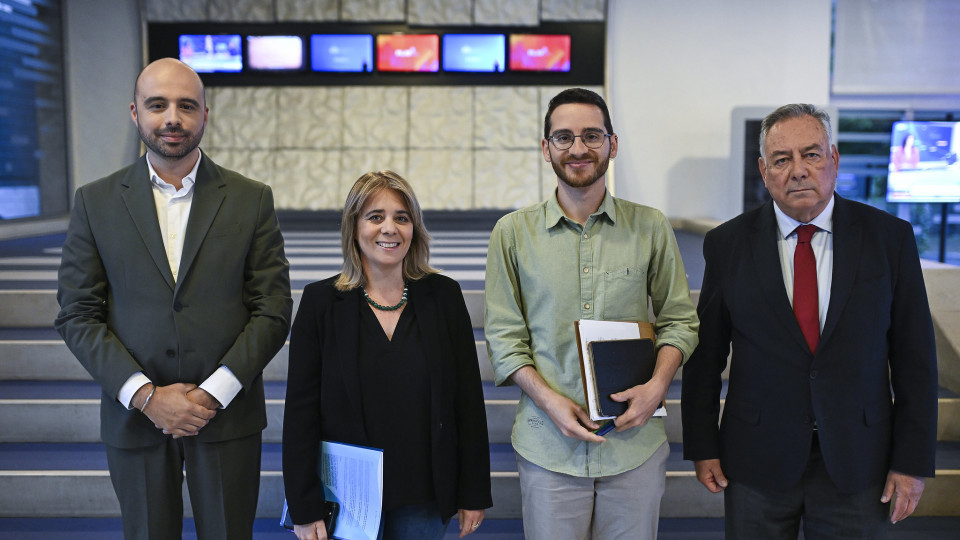Chega wants Ukraine strong in negotiations and BE says that the EU "didn't try" for peace
The Chega party's lead candidate for the European elections today defended the continuation of support for Ukraine to strengthen this country in possible negotiations and the BE considered that the European Union "has not tried" the path to peace.

© RTP

Política Europeias
These positions were defended in the debate between the top candidates of Chega, BE, PAN and Livre for the European elections of June 9, broadcast by RTP and RTP3, in which the candidates were questioned about the continuation of support from the member states of the European Union (EU) to Ukraine, after more than two years of invasion by the Russian Federation.
"It is necessary to support Ukraine and give it strength so that Ukraine does not go to the negotiating table in a position of inferiority", defended ambassador António Tânger Correia, top candidate of Chega, for whom the Russian invasion was "a fatal miscalculation" by Putin.
Asked whether a victory for Donald Trump in the November elections in the United States of America could pose a danger to Europe, Tânger Correia replied: "Frankly, I still haven't understood why Trump's proposals are conflicting with each other".
For BE, the top candidate and former coordinator of the party, Catarina Martins, argued that the EU "has not tried" a path to peace.
"The European Union has not assumed the responsibility of promoting a peace conference under the aegis of the United Nations. The EU has not had an autonomous strategy, it talks a lot about weapons, it never talks about peace. Of course, Ukraine has the right to defend itself, but a strategy for peace is needed. Wars end in peace conferences", she argued.
Francisco Paupério, top candidate of Livre, rejected the intervention of European military personnel in Ukrainian territory -- an idea already defended several times by French President Emmanuel Macron -- but considered that Ukraine should continue to be supported, namely in the recovery of the country's infrastructure.
Pedro Fidalgo Marques, number one of PAN, also advocated support for Ukraine both at the military level and through diplomacy, warning of the environmental impact of wars: "If the war industry were a country, it would be the fourth most polluting country in the world".
Regarding the enlargement of the EU to countries in the east, namely Ukraine, the candidate of Livre, Francisco Paupério, considered that the accession of new member states should be done "at the same pace", with respect for democracy and the rule of law, without accelerations due to "geopolitical issues".
Pedro Fidalgo Marques, of PAN, considered that enlargement can never be seen "as a problem" and Catarina Martins, of BE, defended the need to change European treaties, even independently of possible enlargements.
As for a greater investment in Defence by the EU, Tânger Correia, of Chega, considered that the military industry could be the target of a public-private partnership, in order to control the sale of weapons or other products, and stressed that "being equipped is a form of deterrence".
"It is said that the Japanese did not invade the US in World War II because the Americans were an armed people. It is said, I was not there, but at least that is what is going on in diplomatic circles", he said, a statement that drew strong criticism from Catarina Martins.
The Bloquista rejected a greater investment in this area of sovereignty, arguing that the EU spends more on Defence than Russia and China and warned of the urgency of the climate crisis.
The PAN candidate suggested the creation of an extraordinary contribution on profits from the military industry for humanitarian purposes or to mitigate environmental damage.
Another topic addressed was that of immigration, with the Chega candidate rejecting what he classified as "a wide-open door policy without scrutiny", an idea rejected by all the panel colleagues, with Catarina Martins saying that "the biggest security problem in the EU is the extreme right".
In the final stretch of the debate, Catarina Martins challenged Francisco Paupério, of Livre, a party that is part of the European Greens family, to leave this European political family -- in which "there are parties that are in governments that wanted the migration pact, that are selling weapons to Benjamin Netanyahu [Prime Minister of Israel]" -- and invited him to be "truly on the left". Paupério rejected.
Read Also: Ukraine, security and independence of the EU. Here is the 2nd debate of the European elections (Portuguese version)


Descarregue a nossa App gratuita.
Oitavo ano consecutivo Escolha do Consumidor para Imprensa Online e eleito o produto do ano 2024.
* Estudo da e Netsonda, nov. e dez. 2023 produtodoano- pt.com



